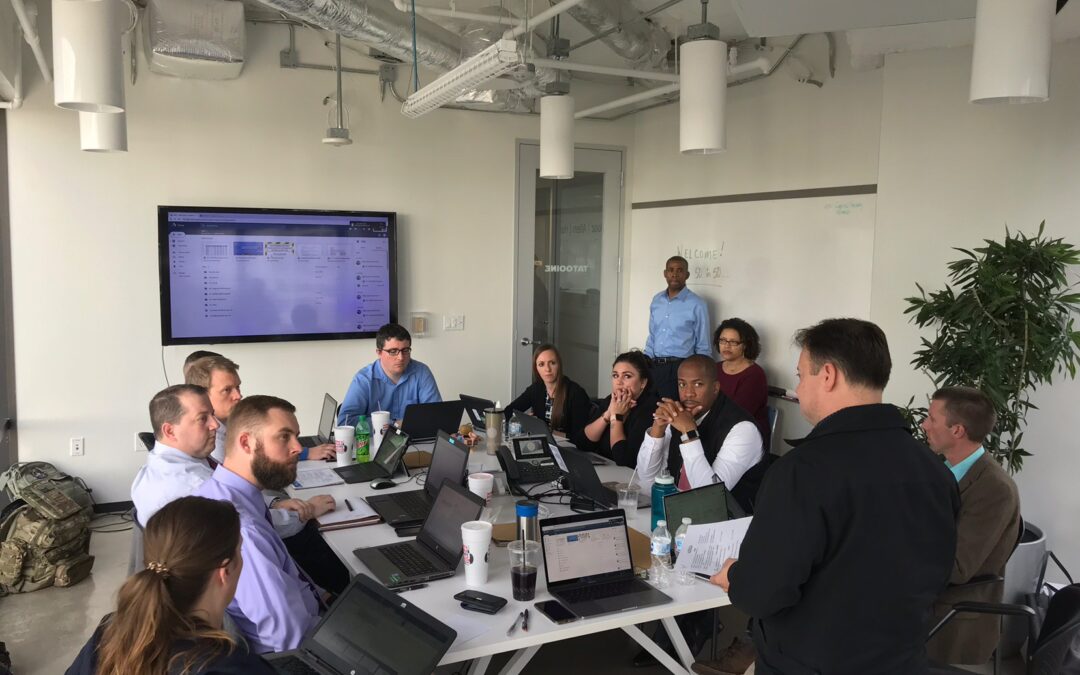WRIGHT-PATTERSON AIR FORCE BASE, Ohio – Contracting officials and innovators from across the Air Force looking to speed up the acquisition process recently awarded more than 100 contracts in 40 hours to small businesses.
Meeting at the AFWERX Innovation Hub in Austin, Texas, they streamlined contracting processes and developed new ways of doing business to accelerate the transfer of ideas from the lab bench to Airmen to increase lethality and provide a technological advantage to warfighters.
The team met Nov. 5-9 and was comprised of personnel from Air Education and Training Command, AFWERX, Air Force Installation Contracting Agency, Air Force Research Laboratory, the Air Force Contracting office, Air Force Life Cycle Management Center, Air Force Space Command, Air Force Personnel Center, and the Air Force Small Business Innovation Research Program office.
Working through the Small Business Innovation Research Program, or SBIR, the group formed with a goal to significantly trim the amount of time it takes to award contracts to businesses.
“Evaluations and awards have typically taken up to six months to complete so we did a number of things to shorten the schedule,” said Ryan Helbach, chief intrapreneur at the Air Force Research Laboratory. “We did evaluations in under a one week, and the contracts in a second week such that within two weeks of the call for proposals closing, we had the companies on contract.”
“It is definitely a change to the normal way of doing business. We’re able to better interact with non-traditional companies by working at the speeds they are used to and all of the technology that’s being developed has dual-use aspects such as virtual reality or augmented reality. These technologies have a lot of commercial development, but also many military applications such as the pilot training program.”
Helbach said he began working with AFWERX personnel in January on efforts to bring new ways of doing business with the Air Force SBIR program through “Special Topics.” SBIR contracts are federally mandated set-asides for small businesses.
“One of the things we did was put out a Request for Proposals which closed in June. We were looking for open innovation dual-use technologies,” Helbach said. “Traditionally, SBIRs are more finite, problem focused looking for something like a new wrench for changing an aircraft tire or they come from the research labs with a research focus such as trying to get a new hypersonic technology going.”
The open topic concept has generated a huge response from the small business community.
“We had 166 companies propose for that topic and we traditionally get about 10-20 companies, so that far exceeded the maximum seen before,” Helbach said. “We ended up awarding 52 contracts out of that cycle. Traditionally, you would award two or three contracts.”
The team also made adjustments to the application process to better match what is familiar to the commercial world by receiving what’s called a pitch deck, or a slide deck, for proposal applications as well as doing shorter durations for the actual contracts.
“We looked at a different way of getting evaluations done, and getting the contracting done. We basically did evaluations and the contracting within 50 days of the call closing,” Helbach said.
News of the accomplishment made its way to the Air Force Contracting office and Dr. William Roper, Assistant Secretary of the Air Force for Acquisition, Technology & Logistics, laid down a challenge, saying “It’s great you did this in 50 days, now, can you do it in 50 hours?”
In order to get from 50 days to 50 hours in the contract award process, the team worked to auto-generate many of the documents necessary to award a contract by leveraging tools provided by AFWERX since the data from the proposals and from the government evaluations was available in their systems. This process was previously a manual one which could take an individual about an hour to do.
For this second round of SBIR contracts, the call for proposals closed October 24 and 279 proposals were received, up from 166 during the previous round. “We’re definitely attracting a lot of non-traditional companies using this broad, open topic approach,” Helbach said.
At the end of the week, the team was able to award more than 100 contracts in 40 hours, surpassing their goal.
“When the standard is about two or three in six months for a normal SBIR topic, this is amazing,” Helbach said.
Some of the technologies the team is working with include:
· Use of virtual reality to enhance and accelerate training for pilots, maintenance personnel, and other AF jobs.
· Adaptive virtual maintenance trainer for relearning and executing aircraft maintenance procedures.
· Ruggedized, mobile telemedicine system capable of operating on a low-bandwidth system that can provide an alternative medical treatment platform to the warfighter.
· Creation of a fleet of small unmanned aircraft systems that is capable of autonomous navigation and delivery of 10-20 pounds of supplies in distances of 500+ miles.
· An integrated digital health platform that pairs cloud software with exercise and rehabilitation equipment to provide outcomes-based data collection and optimized routines.
With rapid technological change now the new normal, it can be an advantage to those able to swiftly develop and field solutions to problems. Answers to many complex security issues will be delivered by harnessing the power of innovators and entrepreneurs within the Air Force, across the country, and throughout the world.
AFWERX Austin is the latest addition to the Air Force’s Innovation Hub network and provides an “Open to the Public” interface that connects innovators from industry, academia, and government to gather for collaboration.

